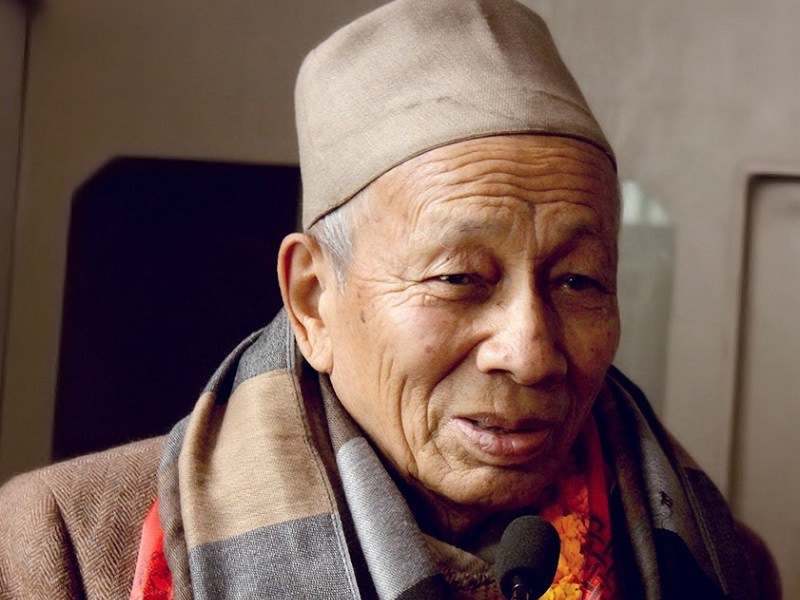Saturday 27th July 2024

Satya Mohan Joshi is the first name that comes to one’s mind while speaking about scholarly expertise in Nepal history, language and culture.
Joshi (98), currently the Chancellor of Nepal Bhasa Academy, served key positions in his long career. He served as the first Director of Archaeological and Cultural Department, Government of Nepal in 1959. He is one of the Executive Board members of Nepali Art Council and a lifetime member of Royal Nepal Academy.
Joshi contributed a lot to Nepali art and culture by establishing organizations such as Rastriya Naachghar – National Theatre in Kathmandu, Archeological Museum in Taulihawa, Archeological Garden in Patan and the National Painting Museum in Bhaktapur.
Joshi‘s efforts towards the preservation of Nepali folk culture hold special significance and he was the first one to initiate a systemic study on Nepali culture.
For his contribution to Nepali folk culture, Joshi was awarded Nepal’s literary honor Madan Puraskar Award three times for his works, Hamro Lok Sanskriti – Our Folk Culture (1956), Nepali Rastriya Mudra – The Coinage of Nepal (1957) and Karnali Lok Sanskriti – Folk culture of the Far-Western Zone Karnali (1971). He is also a Shrestha Sirpa award holder for his outstanding book Jayaprakash, an epic in Nepali language (Newari).
Joshi is also a poet, dramatist and research analyst, and has more than 60 publications including Karnaliko Lok Sanskriti (a research collection) and Charumati, Sun Keshari, Mahipa: Lakhe, Bagh Bhairab (dramas), among others in various fields.
Joshi’s famous publication, Cultural Policy: A Preliminary Study, features research on properties, heritage and policy related to culture. It also deals with some basic principles of National Cultural Policy, Cultural Diversity and National Culture and a study report on Karnali folk culture.
Despite his expertise in in various fields, Joshi has special place for folk culture in his career.
“Folk culture is my subject and my career started by collecting folk songs. After my first Madan Puraskar, folk culture became a new subject in itself to be analyzed and researched. It was not only folk songs, but also about folk tales, folk riddles, folk lifestyle and its development,” said Joshi in an interview.
During his college days, Joshi used to find his recreation in local love songs sung at Rodhi Ghars, the singing clubs in eastern part of Nepal, which he says, have played a major role in his life.
During his affiliation with village locals, Joshi collected various folk songs in written format and got them published in the monthly paper Aantarang, during which, he met Editor Gopal Prasad Risal. Joshi terms Risal’s role as vital in driving his focus towards folk culture, which made him come out with the award-winning work, Hamro Lok Sanskriti.
Born in 1920 to Shankar Raj and Rajkumari Joshi of Lalitpur District, Nepal, Joshi joined Durbar High School, Kathmandu for schooling. He went on with higher studies and graduated from Trichandra College, a constituent campus of Tribhuvan University in Ghantaghar, Kathmandu with a bachelor’s degree.
Joshi served in government department before he moved to China, following a political change in 1960, where he spent almost five years teaching Nepali at the Peking Broadcasting Institute.
During his stay in China, Joshi did a research on Arniko – a genius sculpture of Malla period, who migrated to China in early 1260 AD, which later helped him in setting up the Araniko White Dagoba Gallery in Kirtipur.
As part of his study on western and eastern literature, Joshi drew a lot of inspiration from the works of Tennyson, Woolworth, Kalidas, Raghubansha and Percy Bysshe Shelley, among others.
In respect to his contribution to Nepali art and culture, the Ministry of Culture, Tourism and Civil Aviation, Government of Nepal honored Satya Mohan Joshi with the ‘Litterateur of the Century’ title on August 23, 2017.
Thanking the government for such recognition, Joshi said, “Diversity of Nepali art and culture should be exposed to the world.”
According to Joshi, outside intervention and influence have changed the habits of Nepal public. “Our culture and lifestyle is changing rapidly. At present, I feel that we have not been able to stand on our own feet. We are forgetting our nationality, identity and fundamental nature and one of the main causes is the situation in the country,” said Joshi in an interview.
Speaking on his overall contribution, Joshi terms his research on Arniko and the Coinage of Nepal as benchmarks for aspiring scholars.
Despite his notable achievements, Joshi limits himself saying, “I have done my part and am happy when friends wish me for a job well done.”
Leave a Reply